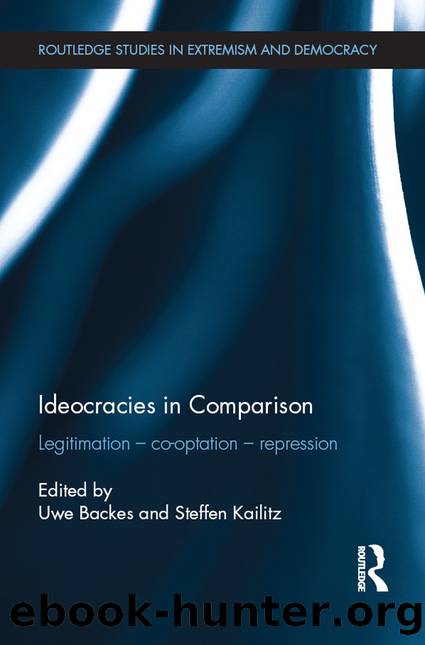Ideocracies in Comparison: Legitimation - Cooptation - Repression by Uwe Backes & Steffen Kailitz

Author:Uwe Backes & Steffen Kailitz [Backes, Uwe & Kailitz, Steffen]
Language: eng
Format: epub
Tags: Political Science, General, Social Science
ISBN: 9781138848856
Google: AQPQrQEACAAJ
Goodreads: 26536446
Publisher: Routledge
Published: 2015-10-28T00:00:00+00:00
Legitimation, co-optation, and repression under Mao Zedong
Building up the Communist state
After proclaiming the Peopleâs Republic of China on 1 October 1949, the CCP continued its efforts at state-building under the leadership of Chairman Mao Zedong. State-building has begun in the 1930s in those areas of China held by CCP forces (âSovietsâ) and was supported by the Soviet Union.7 This phase was characterized by two concomitant efforts: industrialization and the setting up of a Leninist political system, in which party and government are interwoven. Tax income, government bonds, and donations enabled the rulers to quadruple government expenditures from 7 million yuan RMB in 1950 to 29 million yuan RMB only seven years later. These funds were predominantly invested into building a foundation for economic growth in the war-ravaged country. In 1950, 60 percent of government expenditures went into defense and administration, while only 36 percent went into improving the economic infrastructure and the provision of public services. By 1952, these ratios had been reversed.8 Between 1951 and 1960, military expenditures remained constant in absolute terms, and administrative outlays increased only marginally.9 According to Tony Saich, â[T]he achievements by the mid-1950s were impressive. The country, with the exception of Taiwan, was unified, the rural revolution completed, inflation tamed, and solid economic growth achieved.â10
Political liberalization seemed to follow at the heels of improved economic performance. In 1956 and 1957, Mao Zedong appealed to CCP members and the general population to critically evaluate the CCPâs performance and make suggestions for improvement. After a period of cautious hesitation, intellectuals bitterly criticized phenomena like corruption and nepotism among party officials, the dictatorial character of the regime and flawed agricultural policies.11 Later, other population groups joined the chorus. Mao Zedong, who, along with prime minister Zhou Enlai and CCP General Secretary Deng Xiaoping, had initially supported a cautious liberalization of the regime, reacted to this criticism by switching sides. Mao teamed up with Zhu De, the commander of the Peopleâs Liberation Army (PLA), and PLA General Peng Dehuai, both staunch opposers of economic liberalization.12 In 1958, the regime entered its totalitarian phase, which was characterized by massive indoctrination, massive repression, and a low degree of co-optation and performance legitimacy.
Download
This site does not store any files on its server. We only index and link to content provided by other sites. Please contact the content providers to delete copyright contents if any and email us, we'll remove relevant links or contents immediately.
The Secret History by Donna Tartt(19088)
The Social Justice Warrior Handbook by Lisa De Pasquale(12190)
Thirteen Reasons Why by Jay Asher(8909)
This Is How You Lose Her by Junot Diaz(6887)
Weapons of Math Destruction by Cathy O'Neil(6279)
Zero to One by Peter Thiel(5802)
Beartown by Fredrik Backman(5754)
The Myth of the Strong Leader by Archie Brown(5507)
The Fire Next Time by James Baldwin(5444)
How Democracies Die by Steven Levitsky & Daniel Ziblatt(5218)
Promise Me, Dad by Joe Biden(5153)
Stone's Rules by Roger Stone(5088)
A Higher Loyalty: Truth, Lies, and Leadership by James Comey(4963)
100 Deadly Skills by Clint Emerson(4925)
Rise and Kill First by Ronen Bergman(4789)
Secrecy World by Jake Bernstein(4753)
The David Icke Guide to the Global Conspiracy (and how to end it) by David Icke(4718)
The Farm by Tom Rob Smith(4509)
The Doomsday Machine by Daniel Ellsberg(4490)
